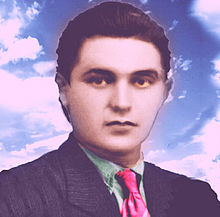Luther Blissett (collective pseudonym)
Luther Blissett is a freely usable collective pseudonym and media phantom. With the release of the name, the separation of the individual and the collective should be abolished.
history
The name "Luther Blissett" goes back to a real person, the Caribbean-English professional footballer Luther Blissett , who played for Watford FC and AC Milan in the 1980s, among others .
In 1994 a group of subcultural activists in Bologna launched a series of hoaxes in Italian mass media that established Luther Blissett as a collective phantom and prankster . The group's actions also included the hijacking of night buses in Bologna, which they converted into moving discos.
As a founding myth of an invented story in the popular television show was Chi l'ha visto ?, the Italian equivalent of Please login , launched. In the program it was “reported” that a British performance artist was missing while attempting to trace the contours of the word ART ('art') on the Italian map with a bicycle .
Between 1994 and 1999, numerous pranks went back to the pseudonym "Luther Blissett", including a forged book under the name of the popular subculture author Hakim Bey and the arrest of several people in Rome who insisted on calling it "Luther Blissett" only buy a tram ticket. Italy, especially Bologna and Rome, remained at the center of Luther Blissett's activities, but the name was also adopted by artists, underground musicians and political activists in England, Spain, Germany and the USA.
After the mass media saw through the game and were no longer irritated by Luther Blissett actions, the Italian Luther Blissett project announced its " Seppuku ", ritual suicide, in 1999 . The five founding activists from Bolognese identified themselves by name and published, still under the name Blissetts, the jointly written novel Q , which tells the story of left Italian counterculture in the guise of a historical novel about the Reformation period. Q became an international bestseller. Since the imprint allows the book to be freely copied, it is probably the most commercially successful open content publication to date.
The five founding activists continued their joint literary work under the new pseudonym Wu Ming and published several successful novels in Italy with which they went on extensive reading tours through Italy, for more details see the main article Wu Ming .
In the German-speaking countries, in addition to the German translation of Q, the Handbuch der Kommunikationguerilla (together with Sonja Brünzels, 1997), the Plunderphonics CD Vivacide (1996) and the text collage The Invisible College have been published under the name Luther Blissett .
Immediate forerunners and inspirations of the Luther-Blissett Project were the neoist multiple identities Monty Cantsin and Karen Eliot . Further formative influences were the Situationist International and the Bolognese subculture of the 1970s around the collective of the newspaper A / traverso and the radio station Radio Alice . Other well-known multiple names are Subcomandante Marcos ( Zapatista Movement in Mexico) and General Ludd ( Luddites or English labor movement ). The pseudonym Rrose Sélavy , which was used jointly by the artist Marcel Duchamp and the surrealist poet Robert Desnos in the 1920s , forms another, less well-known historical pretext, see also the scientist collective Nicolas Bourbaki .
Others
- Luther Blissett also appears as a guest on a record by the punk band Klasse Kriminale .
- The songwriting duo The Three Funny Two claims that Luther Blissett worked for them as a lawyer and represented them in the proceedings for the murder of Øystein Aarseth .
See also
Web links
- Literature by and about Luther Blissett in the catalog of the German National Library
- Archives of Luther Blissett Manifestos and Writings from 1994 to the present day (Italian, English, Spanish)
- Scientific work on the Luther-Blissett-Project (University of Frankfurt)
